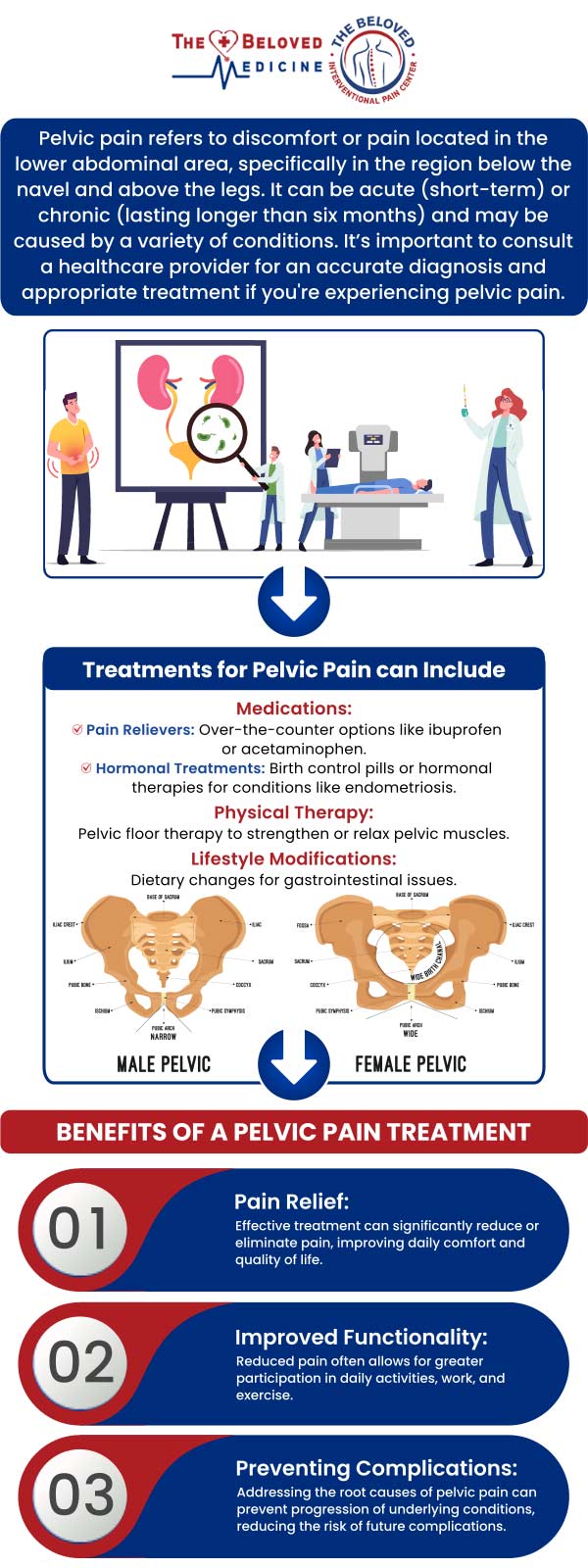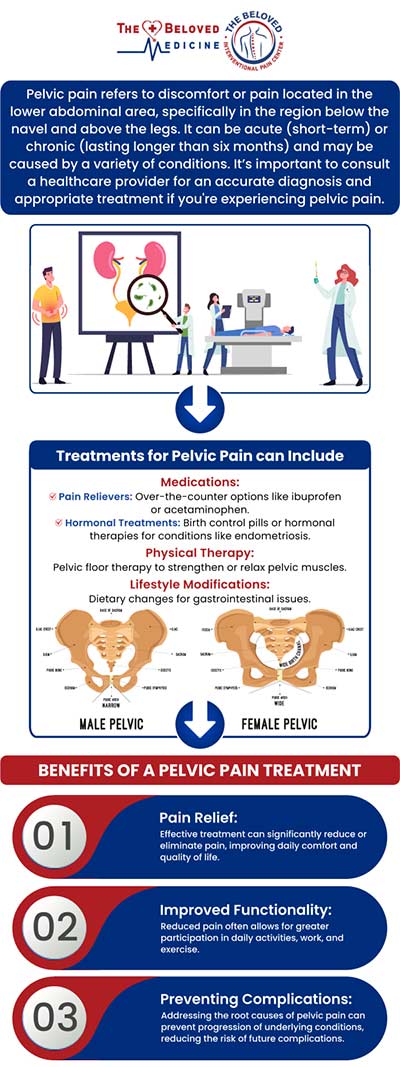Chronic Pelvic Pain Treatment in Dallas, TX
At The Beloved Medicine Clinic and Pain Center, Dr. John Melek offers specialized care for chronic pelvic pain, particularly in females. Dr. Melek employs advanced techniques such as perineural injections to address refractory pain conditions. His patient centered approach combines medical expertise with compassionate care to effectively manage chronic pelvic pain and enhance quality of life. For more information, contact us or request an appointment online. We are conveniently located at 7777 Forest Ln Suite A315, Dallas, TX 75230.




Table of Contents:
What is considered chronic pelvic pain, and how does it differ from acute pain?
What are the key characteristics of chronic pelvic pain?
How do you determine if the pain is related to a specific part of the pelvic anatomy?
What happens during an initial consultation for chronic pelvic pain?
We understand that chronic pelvic pain is a complex condition that affects many aspects of our patients’ lives. Chronic pelvic pain is typically defined as pain in the pelvic region that persists for six months or longer, either continuously or intermittently. While acute pelvic pain often signals a specific injury or illness—such as an infection, appendicitis, or a ruptured ovarian cyst, which usually resolves with treatment—chronic pelvic pain can linger well beyond the expected period of healing.
Unlike acute pain, chronic pelvic pain often has multiple contributing factors, including gynecological, urological, gastrointestinal, musculoskeletal, or even psychological origins. In some cases, no single cause can be identified, which can add to the frustration and distress for those affected. The persistent nature of this pain can significantly impact daily activities and quality of life, making everyday tasks challenging.
Our experienced team takes a comprehensive, multidisciplinary approach to managing chronic pelvic pain. We work closely with each patient to identify potential causes and create a personalized treatment plan that goes beyond symptom relief. Our approach may include medical management, physical therapy, interventional pain procedures, counseling, and lifestyle recommendations to address both the physical and emotional aspects of chronic pelvic pain.
We recognize that chronic pelvic pain can have a profound impact on our patients’ daily lives and overall well-being. Chronic pelvic pain is defined as pain in the pelvic region that lasts for at least six months. This pain can be constant or come and go, and it is often so severe that it interferes with work, family life, and day-to-day activities.
Our patients often describe chronic pelvic pain as dull, aching, sharp, or cramping, and the intensity can vary significantly from person to person. Sometimes, the pain is not directly tied to the menstrual cycle, but for some, it may worsen during menstruation.
In addition to pelvic discomfort, many people experience other symptoms such as pain during intercourse (dyspareunia), pain while urinating (dysuria), pain during bowel movements, or lower back pain. The pain may be difficult to localize and can radiate to the back, thighs, or buttocks. We also understand the emotional and psychological toll this condition can take—chronic pelvic pain can contribute to anxiety, depression, and challenges with sexual health.
There are many possible causes of chronic pelvic pain. Common gynecological causes include endometriosis, pelvic inflammatory disease, and ovarian cysts, but non-gynecological factors such as irritable bowel syndrome, interstitial cystitis, and musculoskeletal problems can also play a role. In some cases, no specific cause can be identified, which can make the pain even more frustrating.
Our team is dedicated to providing comprehensive care for patients experiencing pelvic pain. Determining whether pain is related to a specific part of the pelvic anatomy requires a thorough clinical assessment tailored to each individual. Our experienced clinicians begin this process by taking a detailed medical history, asking you to describe the exact location, quality, and timing of your pain, as well as any factors that improve or worsen your symptoms.
For example, if you experience pain in the lower abdomen that intensifies during menstruation, our providers will consider gynecological causes such as endometriosis or ovarian cysts. If your pain radiates to your back or legs, or is accompanied by urinary symptoms, we may investigate potential involvement of the urinary tract or nerves.
During your visit, our healthcare professionals will perform a careful physical examination, gently palpating different areas of the pelvis to localize the pain. For women, a pelvic exam allows us to assess the uterus, ovaries, and bladder for tenderness, swelling, or masses. For men, the examination may include evaluation of the prostate and testes. These steps help us narrow down the source of your pain to a particular organ or tissue.
We understand that chronic pelvic pain can significantly affect your daily life and well-being. During your initial consultation with our compassionate healthcare team, we take a comprehensive and personalized approach to understanding your symptoms and concerns.
Your visit will begin with a thorough review of your medical history. Our provider will ask detailed questions about your pain—such as its location, severity, duration, and any factors that make it better or worse. We will also discuss your menstrual history, sexual health, history of pregnancies, previous surgeries, and any other relevant medical conditions. Questions about your bowel and bladder habits, as well as any previous infections or injuries, are a routine part of this process to ensure we have a complete picture of your health.
Following your history, a physical examination will be performed. This may include a general physical assessment and a focused pelvic exam to identify any areas of tenderness, masses, or other abnormalities. When appropriate, our provider may also check for signs of pelvic floor dysfunction or musculoskeletal issues that might be contributing to your pain. For more information, contact us or request an appointment online. We are conveniently located at 7777 Forest Ln Suite A315, Dallas, TX 75230. We serve patients from Dallas TX, Plano TX, Addison TX, Richardson TX, Garland TX, and surrounding areas.





